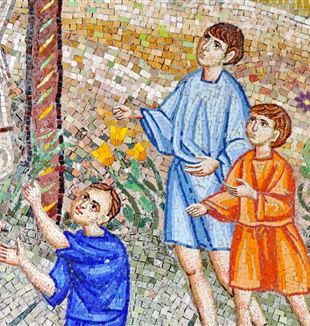
A Call to Educate
A group of people from all over the United States has been meeting regularly via conference call to discuss education in light of their experiences. Read the full story.What is the criterion by which we judge how to spend our time? What impact does the physical space we inhabit have on us? What is our relationship with technology? What does it mean for our children to be children of God? Every few weeks, people from varying walks of life take time from their busy days to connect via conference call and discuss their experience in light of questions such as these. This series of calls was born out of the vocalization of a simple and concrete desire.
Last summer, Stephanie Stokman, a mother of four from Madison, Wisconsin, was asked to take the lead to create a more concrete proposal for the children for her fraternity group’s summer vacation. During that very time, she was also grappling with the education of her own children; She was considering homeschooling and had been researching educational philosophies and methods to help her come to a decision.
During the vacation, Stokman’s work with the children led her questions to emerge even more strongly. “I wanted to share my questions with this place that helped me grow so much,” said Stokman. She brought her questions to Fr. José Medina, who, rather than simply giving her advice, suggested they meet regularly to discuss matters of education along with others who shared similar questions.
The “Education Series” meetings were originally proposed only to those in Stokman’s fraternity group, but as soon as others began to catch wind of the content, the group started rapidly growing. There are now 120 people on the mailing list, with about 40 regular attendees.
The goal of the calls is not to give a step-by-step parenting guide. “We don’t leave with any specific details or instructions,” says Maristella Lucchini, a mother and engineer from New York. Rather, one “leaves with so many questions about how we were doing simple things.” For instance, after a call in which praying with children was discussed, Lucchini’s family began putting effort into including prayer in their daily routine. “We are not super consistent, honestly,” she said. “But there is always this desire to come back to this beautiful experience. ... Sometimes I’ll be running the one hundred meters to school with my daughter and we’ll pray then. [The calls] impact me by keeping alive the desire for our life together to be beautiful.”
For others too, often through the verification of Fr. Medina’s suggestions, the fruitfulness of the calls is seen in an increased attention to the way in which these “simple things” are done throughout the day, resulting in the discovery of unexpected beauty and meaning. For example, after Fr. Medina pointed out that family dinners are one of the main introductions to the Eucharist for children, Stokman began curating family dinners with greater attention. “Sometimes [my daughter] will say, ‘Wow this is a really nice table!’ ... Seeing dinner as a part of this larger reality was really interesting. It shows you’re cared for when someone has taken the time to set a beautiful dinner table for you.”
Andrew Hamm, a writer from Washington D.C., was also struck by Fr. Medina’s simple suggestion to read more with one’s family. Hamm currently lives with his brother who has Trisomy 21. Hamm explains that reading was “one thing that my brother and I had never done together,” but they decided to give it a try. “We don’t read every day but reading together has brought us closer together. It’s been a more human way of being together. Every time I ask my brother, ‘We can read, or we can do puzzles,’ he always chooses to read.”
Recently, the calls have focused on an aspect of daily life which is often taken for granted: our relationship with technology. Janel Lewandowski from Minnesota has been particularly helped by these talks. Her children were issued laptops from school, and that brought up many questions for her: “Don’t they know it’s better to spend time together rather than sitting on their screens? Aren’t they made for the same purpose as I am?” Participating in the “Education Series” calls allowed Lewandowski to realize her desire to educate her children’s freedom before technology, rather than impose arbitrary regulations. “The calls made me look at how we want to spend our time together, and try and live by certain values,” she said, “rather than just saying, ‘Get off the computer!’ or unplugging the modem.”
Lewandowski saw the content of the calls as a “totally unique starting point,” and desired to share their helpfulness with her parish community. “In the end, we had two one-hour long meetings … with about forty to fifty people each. I'd say at least half were from our School of Community, but there were others as well,” she said. “[My friend] Barb and I started the meetings by sharing the nature of the ‘Education Series.’ We read parts of the transcript from the discussion with Fr. José and asked questions for people to ponder during the week. … The discussion became most interesting when we spoke of rest, transitions, and the promise of technology. I could see the wheels turning in people's minds as this was a totally new approach.”
The “Education Series” calls have impacted each participant in unique ways. As many expressed, rather than giving specific guidelines or methodologies, the calls bear fruit by focusing on the education of the educators themselves. As Lucchini said, “These things are really more for me, even though they’re technically about the education of the kids.”